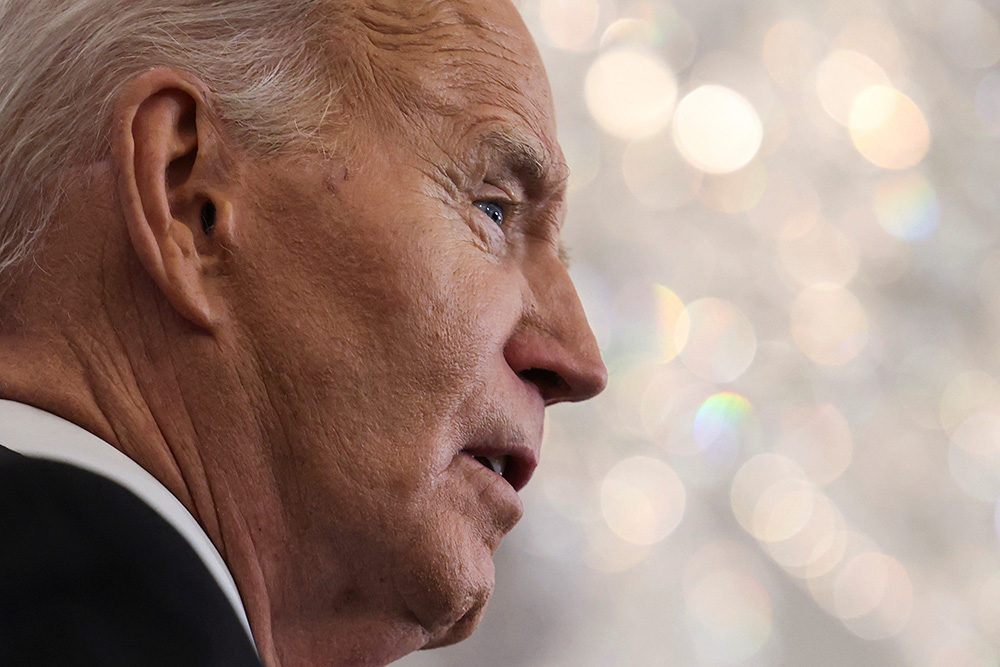
U.S. President Joe Biden delivers a speech at the State Department in Washington, D.C., Jan. 13. (Reuters/Evelyn Hockstein)
President Joe Biden used his farewell address to the nation on Jan. 15 to warn against the concentration of power not only in government but also in other elements of society, such as in corporations and the technology industry.
The prime-time address to the nation from the Oval Office was a capstone to both his single term as president as well as a political career spanning five decades. Biden sought to define his legacy as one of a president who steered Americans through challenging times, including part of the COVID-19 pandemic, and one who defended American institutions.
Biden, who was the nation's first Catholic vice president and its second Catholic president, also urged Americans to "keep the faith."
"After 50 years of public service, I give you my word: I still believe in the idea on which this nation stands," he said. "A nation where the strengths of our institutions, the character of our people, matter, must endure. Now it is your turn to stand guard."
Biden sought to cement his legacy with an American public that is skeptical of his tenure: A recent Gallup poll found that as he leaves office, more Americans expect history to judge the Biden presidency unfavorably rather than favorably.
During the speech, Biden touted a ceasefire and hostage-release deal reached between Israel and Hamas, announced earlier the same day, that he sought for a significant portion of his presidency.
"This plan was developed and negotiated by my team and will be largely implemented by the incoming administration," Biden said.
Biden likened the idea of America to its symbol in the Statue of Liberty, saying, "she was built to sway back and forth to withstand the fury, stormy weather, stand the test of time, because storms are always coming. She sways a few inches, but she never falls into the current below."
American democracy is constantly tested, Biden said, arguing the "concentration of power in the hands of a very few ultra-wealthy people," would have "dangerous consequences if their abuse of power was left unchecked."
"Today, oligarchy is taking shape in America," he argued. "Extreme wealth, power and influence that literally threatens our entire democracy, our basic rights and freedoms, and a fair shot for everyone to get ahead."
Advertisement
He singled out social media platforms "giving up on fact-checking" as a threat to democracy.
"We must hold the social platforms accountable to protect our children, our families, our very democracy from the abuse of power," he said.
He called for a constitutional amendment to "make clear that no president, no president, is immune from crimes he or she commits, while in office," a reference to a July decision by the Supreme Court that found presidents have immunity from criminal prosecution as it relates to core constitutional acts of their office, presumptive immunity for official acts, but none for unofficial acts.
In July, Biden made the historic decision to suspend his reelection campaign in favor of Vice President Kamala Harris after his faltering performance at a debate the previous month cemented longstanding voter concerns about his physical and mental stamina, causing a substantial loss of confidence among voters heading into the general election campaign. Harris went on to lose the election to President-elect Donald Trump, who will be both Biden's predecessor and successor when he is sworn into a second term Jan. 20.
In a letter to Americans published earlier the same day, Biden said it has been "the privilege of my life to serve this nation for over 50 years.”
"I have given my heart and my soul to our nation," he wrote. "And I have been blessed a million times in return with the love and support of the American people.”
A farewell address by an American president is a tradition dating back to George Washington, who used a written address to the nation to announce his decision not to seek a third term.





